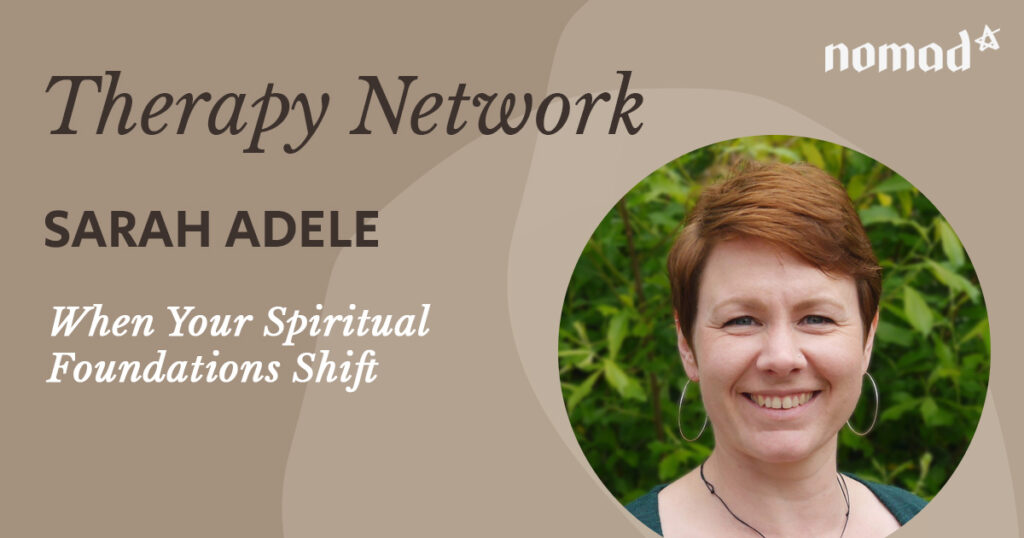Navigating Disorientation
When the familiar foundations of belief begin to be questioned or shift, it can evoke a whole array of experiences. Perhaps curiosity, panic, excitement, fear, exhilaration, uncertainty, or a profound sense of disorientation. The very architecture of your life can seem to lose its solidity, become unsteady, or feel less secure.In my own journey, I felt like I was left looking out over a landscape of ruins. Pillars that had once held foundational beliefs lay toppled. Buildings now indistinguishable from each other. Deconstruction is hardly ever a neat process where we get to carefully choose what comes down and what doesn’t. Our beliefs are complexly intertwined with our sense of self, our place in the world, and our connection to others.Certainty seemed so important, so essential, but now it may seem nothing is certain, and that can be disorientating, confusing or scary.

The Unravelling and Re-weaving of a Worldview
Ascribing to a faith system often goes hand in hand with a worldview, so when we start pulling at a frayed edge of a belief, we can quickly find the thread pulling on many parts of our lives, such as:
- Our most intimate relationships—how we love, who we love, and what we expect from connection
- Our moral and political compass—our fundamental sense of right and wrong, justice, and how society should be.
- The very landscape of our inner world: our feelings, our unconscious defence mechanisms, and our daily behaviours.
- Our understanding of identity, including our internal narrative, our relationship with our body, our cultural and familial heritage, our sexuality, our core values and the parts of ourselves we felt compelled to hide.
- Our hope for the future, our sense of purpose and our relationship with our own mortality and the unknown.
- The boundaries of our own mind—what we feel permitted to think about, question, or doubt and who we can agree with
- Our tribes and our belonging— how we build community, and how to find connection without the requirement of uniform belief.
- Our relationship with authority—who we trust, who we grant the power to define truth, and how we relate to figures of power, both human and divine.
All this can lead to some unsettling findings – maybe we don’t really know who we are, maybe we don’t know what to expect of others and how they treat us, how on earth do we deal with all the unknowns now left behind? What do we do with the fear that arises, and how do we process the grief of losing a spiritual home, and is there space for the quiet emergence of a new sense of self? Will we like who that self is? Will this emerging self be accepted by others in our life?
And yet, within this disorientation, something else can also emerge.Amid this unravelling, it’s possible to encounter something that feels larger than our personal story. These are moments that seem to transcend the individual ‘me’. A sense of deep interconnection with all life, a moment of pure peace in nature, or an intuitive knowing that love is a fundamental, abiding force. This is what some call the transpersonal – glimpses of a reality that isn’t confined by our personal narrative or a specific doctrine. This process, then, isn’t necessarily about ‘healing’ towards a predefined wholeness, but about making space for a different kind of belonging—to something vast and meaningful, even if we no longer have a name for it.
A Space to Be, or to Begin Being
If you find yourself in a similar place, know that the disorientation is a testament to the significance of what you’re exploring. It is a vulnerable and profoundly human place to be. I offer these reflections not as an expert, but as someone who has been changed by profound shifts, both my own and those of the people I’ve had the honour of working with.
Navigating this terrain is deeply personal, and there is no single ‘right’ way to do it. For some, having a dedicated space to process it all can be invaluable. It can be helpful to have someone alongside you to be curious with you and hold a quiet, steady space for you to simply ‘be’ while you go through the tumultuous periods of re-evaluation and rediscovery.
Therapy offers a space to gently acknowledge the internalised voices and early beliefs that have shaped your world, bringing them into conscious awareness to see which still resonate with the person you are becoming. It’s a practice of making room for uncertainty, of allowing the “what is” to simply be—a quiet rebellion against worldviews that demand definitive answers. From this grounded place, you can begin to discern your own voice from the noise, and cultivate a trust in the organic, often messy, unfolding of your own becoming.
The Work of Becoming
If any of this resonates, you’re not alone. Deconstruction isn’t a neat, linear process but a deeply human one. It challenges the very architecture of our inner world. While that can be unsettling, it also creates the necessary space for building a life on a foundation we’ve chosen for ourselves. I would suggest that it isn’t about finding certainty again, but about building a capacity to live meaningfully, even amidst the questions.